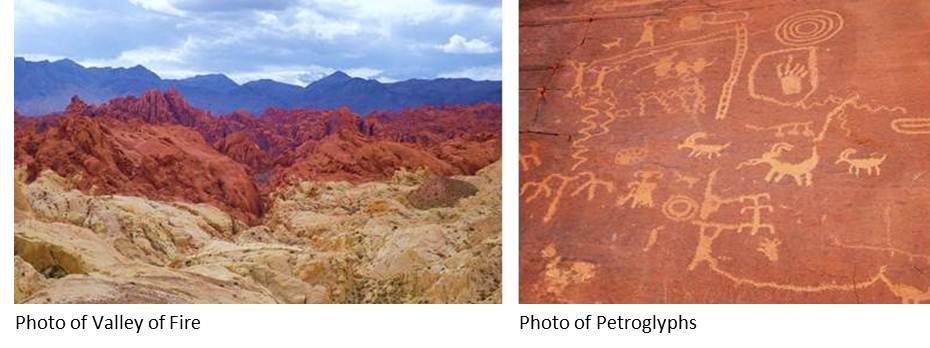Trail Guides
While visiting Nevada to attend this year’s MAGIC Marketplace tradeshow and conference, I had the privilege of touring the Valley of Fire State Park. Navigating through the Mojave Desert’s majestic labyrinth of red, yellow, purple and orange colored mountains, hills and rock formations, we spotted petroglyphs, ancient Native American rock art.
Image may be NSFW.
Clik here to view.
Deciphering the Desert
As we focused our attention on the petroglyphs, everyone began asking questions about the mystical images and guessing their meanings. Our tour conductor, Cliff, shared his belief that the symbols depict a map — to find water.
During our drive to the valley, Cliff discussed the linkage between the scarcity of water in this desert and the evolution of local roads, stating “As ancient Native American tribes crossed the deserts in search of water, they mapped out the trails that led to springs.” Passing down this information from generation to generation, for hundreds of years, allowed their members to follow the same routes and guide others to water. As the trails became more and more visible, less instruction was needed and people could see the paths for themselves. The local villages and cities that emerged were connected by those routes. Thus, many modern roads developed from ancient trails because people helped each other to find water.
Peaceful Paths
We left the desert and entered a conference room to meet a modern day trail guide, Sean Carasso. Sean, Founder of Falling Whistles, inspired the audience with his passionate campaign to help end the war in the Congo, during Magic’s Seminar Impact your Fashion World: Action = Creativity. He described how he visited the Congo a few years ago, wrote a journal of what he witnessed, spread the information to thousands of people and leveraged support to start, as he stated, “Turning tools of war into tools of peace.” Sean’s organization brings attention to this conflict through the creative marketing/sales of whistles and uses the funds to support groups working for peace in the Congo (http://www.fallingwhistles.com/). He selected whistles, as a symbol of protest, because kids in the Congo are forced to become child soldiers; too young to carry arms, they enter battles with only whistles. Sean said “Their sole duty is to make enough noise to scare the enemy and then receive – with their bodies – the first round of bullets. Lines of boys fell as nothing more than a temporary barricade.”
The audience was very encouraged by his leadership and discussed the need for more people to get involved and help end conflicts in other areas of the world. One young woman expressed her concern about the possible negative reaction that a company may receive if it’s associated with specific causes/organizations, which may not be popular with the general public. Sean responded to her by advising that one has to weigh the risks of one’s fears with not doing anything at all. He concluded his presentation, stating “Be a whistleblower for peace; now, in the present, the Individual has more power than any other time in history!”
Paving the Way
Corporations also have great power. Walter Robb, Co-CEO of Whole Foods Market shared his belief that companies and individuals “can change the force of business in the world,” as he discussed the four elements of Conscious Capitalism: Stakeholder Orientation, Conscious Leadership, Higher Purpose and Conscious Culture, during this year’s National Retail Federation Conference’s Conscious Capitalism panel. He advised that great companies not only make a profit but also “deliver happiness; they have a greater purpose/deeper aspirations.” While providing examples of the Whole Planet Foundation’s global projects, Walter stressed the importance of a company’s mission and values, adding “Core values represent stakes on the ground, a deeper purpose; it gives customers and employees a way forward as one navigates a turbulent world.” Employees and customers support the Whole Planet Foundation’s work in over 50 countries; the ventures helped over one million people by empowering global entrepreneurs through microcredit projects (http://www.wholeplanetfoundation.org/).
“Helping each other is only limited by our imaginations!” declared Kip Tindell, CEO of The Container Store, as he spoke with Walter on the Conscious Capitalism panel. Kip talked about the importance of building sustainable relationships through the mutual respect and trust of employees, vendors and customers, adding “People value relationships and people do business with people they trust.” He also stressed the importance of developing a mindful corporate culture, advising “Happy employees are productive employees; the true essence of the human spirit is to go to work with great people and accomplish wonderful things and one can feel it in the culture.” Kip provided many examples of how The Container Store achieved and maintains its corporate culture (http://standfor.containerstore.com/). He concluded with the following insight “A thoughtful approach to stakeholders in the business gives you a competitive advantage…the Universe conspires to assist you when a company functions this way.”
Global Streams
During the Fashion Institute of Technology’s Talking Trade @ FIT Guest Lecture Creating Sustainable Futures: Women’s Empowerment through the International Fashion Industry, students and guests heard stories from more leaders that are using their power and influence to make a difference in the lives of people around the world. Panelists included Richa Agarwal, Design Management Consultant and Project Manager with BRAC USA; Ben Stone, President and CEO, Indego Africa; Craig Leavitt, CEO, Kate Spade New York and Deborah Lloyd, President and Chief Creative Officer, Kate Spade New York. All of these speakers are serving as trail guides by improving the lives of women from Africa to Bangladesh, from Europe to Afghanistan.
For example, Craig Leavitt talked about Kate Spade’s partnership with Women for Women International, stating “It fits with our firm’s DNA and resonates with our customers and staff.” His company’s Hand-in-Hand program offers a sustainable form of employment for hundreds of victims of global wars and conflicts in countries such as Bosnia, Rwanda and Afghanistan, utilizing the women’s indigenous skills and local materials to produce exclusive products. The program also provides health and educational benefits to the women and their children (http://www.womenforwomen.org/help-women/kate-spade-hand-in-hand.php). Craig advised that his business is guiding these women by “creating self-sufficiency through economic power.”
Likewise, Indego Africa empowers women through fashion. Ben Stone explained how his organization assisted in the significant improvements of the lives of hundreds of Rwandan women artisans and their families by connecting them to export markets and education. Indego Africa maps out a path for artisans to produce and market fair trade products through co-design collaboration with major fashion brands, such as Nicole Miller and Anthropology. Ben’s ultimate goal is to create empowered independent businesswomen who can work directly with fashion brands (http://www.indegoafrica.org/). He described his operations as having extreme transparency, stating “All financial documents are online and the public can visit our website to learn about the artisans and verify social impact.”
In addition, Richa Agarwal explained how her organization, BRAC, contributes to poverty alleviation by creating job opportunities for rural women in Bangladesh. BRAC supports over 65,000 rural artisans, most are women working in the apparel industry, in over two thousand villages across the country; the services offered include microfinancing, legal support, educational opportunities, community empowerment and water/sanitation assistance (http://www.brac.net/). During her presentation, she shared photos and many success stories of these women. Richa concluded by addressing the students with the following plea “Think about the people that make our clothing…keep these women in mind when you get jobs because each one of you can make a difference; you will be in decision making roles that could affect the lives workers all over the world.”
Spring for Hydration
While returning to NYC from Nevada, I had an amazing view of our Southwest topography. Flying over 30,000 feet, I observed the curves of current flowing rivers and dried-up riverbeds and recalled a story that Cliff told us about the common occurrence of people getting lost in the desert, never finding water or the way out and dehydrating. Viewing life from different levels, it’s clear to see that world society lives in both physical and nonphysical deserts, is in need of and deserves water and has infinite potential to imagine, inspire and create countless trail guides.
Image may be NSFW.
Clik here to view.
Written by Professor Shireen Musa,
Fashion Institute of Technology, State University of New York